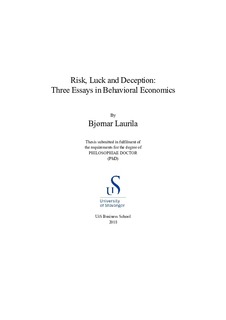| dc.description.abstract | Two of the pillars in the field of behavioral economics which we are concerned with are motivation and rationality. In this thesis, which consists of three papers, I explore both these topics, and each of these papers are motivated by different aspects of money managers’ profession; specifically, when they invest, give advice, or their motivation to work. Studying and understanding these aspects is important because money managers and investment decisions can have huge impacts on people’s financial situations. In particular I am interested in investigating whether advice given to customers depends on the customer’s wealth level. One reason for investigating deception in this setting is that financial advisors often have incentives which are misaligned with those of the customers. In addition, financial advisors do meet many different customers with varying levels of wealth and opportunities. Thus, I find it interesting to investigate this and how different clients affect advice. When it comes to the amount of work that money managers put in, research shows that some are able to create additional value. However, effort is likely not the only cause of this additional value, and for the majority of money managers they are likely paid for luck. So why then do they put in so much effort? Possible explanations include signaling, or they believe it creates value. Lastly, costs can have a huge impact on compound returns. As a result, I find it important to understand how people take these costs into consideration.
I use experiments as a means to identify the causal effects, because this empirical method allows for an unprecedented control over the environment and allows me to change one factor at a time.
As a starting point I will present the concepts central to the three papers in this thesis in the following sections. First, I start with deception, then move on to social preferences, mental accounting, and lastly, luck and motivation. | nb_NO |

